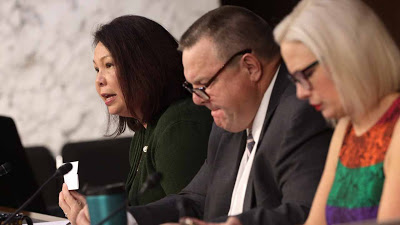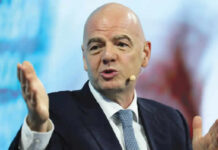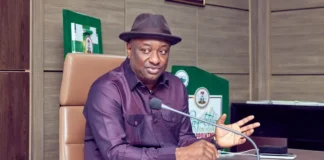Boeing chief executive Dennis Muilenburg faced a barrage of criticism from US lawmakers Tuesday at a jammed hearing on the company’s commitment to safety as family members of victims of two deadly MAX 737 crashes looked on.
In his first appearance before Congress since the 737 MAX was grounded in March, Muilenburg apologized for the crashes and acknowledged shortcomings, but broadly defended Boeing’s development of the ill-fated aircraft.
Senators from both parties signaled clear dissatisfaction, bordering on rage in some cases.
“Boeing is the company that built the flying fortress that saved Europe,” said Democratic Senator Tammy Duckworth, a former National Guard helicopter pilot who lost both legs during the Iraq War.
“You have told this committee and you told me half-truths over and over again,” said Duckworth, who represents Illinois, home to Boeing’s corporate headquarters. “You have not told us the whole truth and these families are suffering because of it.”
Muilenburg stuck to the company’s longstanding stance that development of the MAX followed time-tested company procedures and defended it against charges that it cut corners on safety and was too cozy with regulators the Federal Aviation Administration.
Many analysts view the hearings as a can’t-win situation for Muilenburg and expect him to exit the company in the foreseeable future, most likely after the MAX returns to service.
Asked by a reporter if he would resign, Muilenburg said, “That’s not where my focus is. My focus is on the job at hand focused on safety. And we’re going to do everything we can to ensure safe flight.”
But Nadia Milleron, who lost her daughter on the Ethiopian Airlines crash, said the company needs a shakeup.
Muilenburg “needs to resign. The whole board needs to resign,” she said. “I expect him to stop putting the blame on the FAA and other people because that is what they always do. They don’t take responsibility.”
Passing the buck?
Many of the questions focused on the Maneuvering Characteristics Augmentation System, an automated system that Lion Air and Ethiopian Airlines pilots were unable to control, resulting in crashes.
“We have learned from both accidents and we’ve identified changes that need to be made to MCAS,” Muilenburg told the Senate Commerce Committee.
But Senator Ted Cruz, a Texas Republican, lambasted Muilenburg as he struggled to answer pointed questions about 2016 texts from Boeing pilot Mark Forkner to a colleague that discussed the “egregious” performance of the MCAS during a simulation test and said that he “basically lied to the regulators.”
Muilenburg indicated that Boeing counsel shared the documents with the Justice Department in February, but that he did not see the specific exchange until it was reported by news media earlier this month.
“I was made aware of existence of this kind of document,” Muilenburg told Cruz. “I counted on counsel to handle this appropriately.”
“That is passive voice,” Cruz shot back. “You’re the CEO, the buck stops with you.
“How did your team not put it in front of you, run with their hair on fire and say ‘We have a real problem here?’ How did that not happen and what does that say about the culture at Boeing?”
Senator Maria Cantwell, a Democrat from Washington state where the 737 MAX is built, said the crisis showed that Boeing leadership was failing its employees.
“This isn’t a question about line workers — this is a question about the corporate view from Chicago, and whether there is enough attention to manufacturing and certification,” Cantwell said. “You should take offense to the fact that people say, ‘It’s a great company that’s not being run correctly.’”
Tuesday’s hearing will be followed by a second session on Wednesday in the House Transportation Committee.
Boeing is still targeting regulatory approval for the MAX in 2019, a timeframe that many aviation experts still view as possible.
Senator Roger Wicker, a Mississippi Republican who chairs the Senate committee, told CNBC before the hearing that he intends to scrutinize Boeing’s processes but said he did not see anything that would prevent the MAX from going back into service “fairly soon.”
“I think this plane is eminently fixable,” Wicker told CNBC. “I don’t think it’s a hopeless cause.”
AFP















